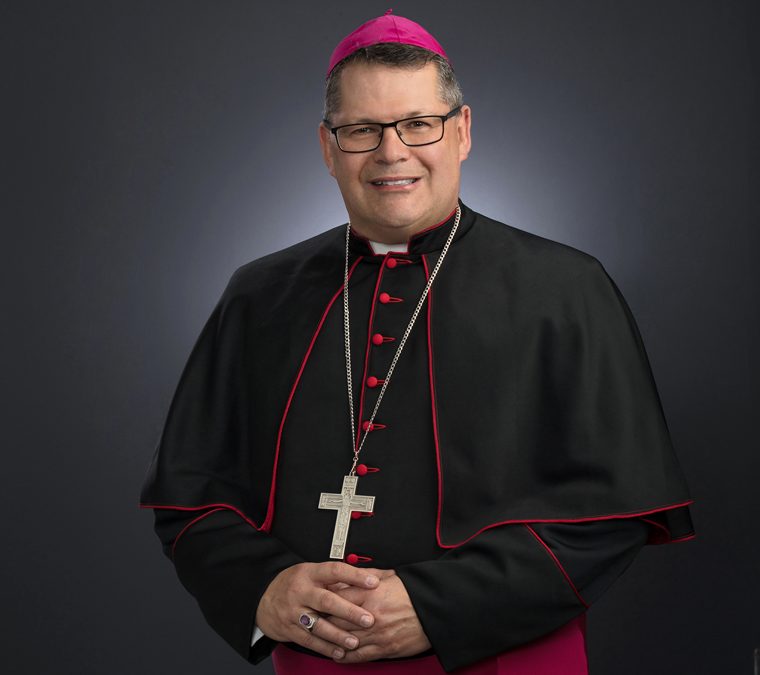As I write this column, we are in the midst of National Vocation Awareness Week. It is a yearly, week-long celebration of the vocations of the priesthood, the diaconate and the consecrated life. We celebrate through prayer and education, along with each of us being sons and daughters of encouragement to those considering these vocations in the Church. Just so you know, I haven’t forgotten about the vocation of marriage which has its own week of prayer and education in the month of February, or about lay ministry which I seek to promote every time I speak about our baptismal calling and especially in our synodal process.
Furthermore, I think this week’s liturgical calendar can help raise our awareness of what God’s call can mean for one’s life. We start on Tuesday, November 9, with the celebration of the Dedication of the Lateran Basilica. What is so significant about this feast is that it celebrates the Mother Church of all churches in the city of Rome and throughout the world. St. John Lateran is the Pope’s cathedral and its famous baptistery (which is the size of a church) contains a baptismal pool into which one descends by one set of stairs and then climbs forth by another as a member of the “Pilgrim People of God” (see Lumen gentium, Ch. 7). Such a scene truly illustrates the essence of our call from God …our vocation … in life—to be a “living temple” that makes Christ’s presence real in the world through how we live our lives. It really doesn’t get any more basic or profound than this!
On Wednesday, November 10, the Church calls to mind a pope who is the first to have the title “Great” appended to his name at his canonization as a saint. Pope St. Leo the Great lived from 400 to 461 and first served the church as a deacon for many years. His ministry was known for his gift of reconciliation both in church and civil disputes. In 440, he was unanimously elected Pope after the death of Pope Sixtus III. As pope, he was known to be a herald of peace, but worked assiduously as well to protect his fellow citizens from the marauders of his day, including Attila the Hun. Leo was known for his pastoral heart, but courageously took on the heresies of his day to restore unity to the Church. His sermons are preserved to this day as a treasury of spiritual gems.
I would like to add a word about the Petrine ministry and how important it is for us to pray for Pope Francis each day. In Matthew 16:17-19, one finds Jesus’ commission to Peter to be the “rock” on which he would build His Church and to whom He gives the “keys of the Kingdom.” To this very day, the Bishop of Rome—the Pope—is known throughout the world as the successor of St. Peter. Even other separated Churches and ecclesial communions, though disputing his primacy, recognize his special place in the apostolic succession. I say this specifically because I am appalled at the disrespect that I have seen being shown to Pope Francis by clergy and laity alike in the Church. Referring to him as if he weren’t the pope or speaking derogatorily of him in such an ill manner. This is none other than Satan at work seeking to divide the Church and it must stop!
In one liturgical commentary I came across the following preaching point on the Memorial of St. Leo the Great: “Peter is the rock on which Christ established the Church. All authority in the Church starts here. For all his doubts and flaws, Peter is also filled with flashes of profound insight, wisdom from the Holy Spirit” (Liturgical Training Publications, Sourcebook 2021, p. 386). There is only one Bishop of Rome and present occupant of the Chair of St. Peter and I invite us to pray for him in his God-given ministry. And like St. Leo the Great, let each of us work for unity in the Church rather than sowing seeds of division, calling to mind the words of St. Paul to the Corinthians:
I urge you, brothers, in the name of our Lord Jesus Christ, that all of you agree in what you say, and that there be no divisions among you, but that you be united in the same mind and in the same purpose. For it has been reported to me about you, my brothers, by Chloe’s people, that there are rivalries among you. I mean that each of you is saying, “I belong to Paul,” or “I belong to Apollos,” or “I belong to Cephas,” or “I belong to Christ.” Is Christ divided? Was Paul crucified for you? Or were you baptized in the name of Paul? (1 Cor 10-13)
On Thursday, November 11, which for us in the U.S. is Veterans Day, we salute all who have served our nation in war and in peace. We also call to mind St. Martin of Tours who before he was ever a bishop of the Church was a Roman soldier. In fact, the life of St. Martin illustrates for all of us the difference that our knowing Jesus Christ is to make in one’s life. The story of Martin’s conversion centers on his encounter with a beggar who was freezing in the cold and he gives him his cloak. He then has a vision of Christ wearing the cloak and he, too, finds himself getting off his “high horse” so to speak (see Acts 9:1-19, Acts 22:6-21, Acts 26:12-180) and hearing the call to “Follow me” (see Mt 4:19, Jn 1:42, Mk 2:14). Is not this call the heart of every vocation?
On Friday, November 12, the Church calls to mind a martyr of Christian Unity—St. Josaphat, bishop. As a member of the Eastern rite of the Catholic Church, he sought to bring about reconciliation between the Catholic and Orthodox Churches some 500 years after the split (schism) of 1054. He was martyred for the faith while preaching his ecumenical message in 1623. Yet, the witness of his life would eventually lead his rivals to seek reconciliation. This memorial highlights our own baptismal vocation to be “ambassadors of reconciliation” (2 Cor 5:20).
Our final liturgical observance of the week is the first canonized saint who was a U.S. citizen, St. Frances Xavier Cabrini. Popularly known as Mother Cabrini, she founded the Missionary Sisters of the Sacred Heart after being turned away by other religious communities, and dedicated herself to serving the immigrant populations of the Americas. Her tenacity and generosity in responding to God’s call in her life are excellent qualities to highlight as we conclude our reflection on vocation awareness. I invite each of us to once again take time out to consider God’s call in our lives. Let us not just look backwards, but also forward because as we turn the corner to the next to last Sunday of the Church’s year, it will remind us that there is still something to wait for …Christ, our hope! All the while asking: “Is He king of my universe?”






